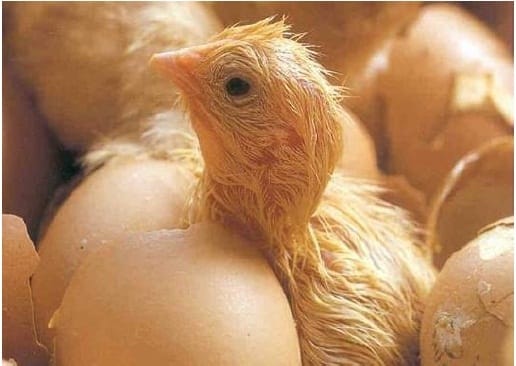...
--> Is this a farm or hatchery problem?
--> When did the problem start?
--> Is this an annual problem?
--> Is there a difference in results by day of the week?
--> Is there a difference between “our” eggs and those bought-in?
--> Are broiler results affected?
--> Have other companies been affected by this problem?
...
QUESTIONS TO ASK WHEN YOUR EGGS DO NOT HATCH
By Brian Hodgette - BH Consulting
.
1. WHAT IS THE PROBLEM?
Are chick numbers down?
Are there more culls and seconds?
Was the hatch early, on time or late?
Are there dead chicks stuck to the hatch baskets?
Do an egg breakout of debris remaining on five hatcher baskets and decide if the problem is embryo mortality or infertility?
If it is embryo mortality then decide when they died: early (first week), mid-term or late on the development. Were there many pips suggesting a late hatch, for example?
…
In other words, define the problem!
.
2. IS THIS A FARM OR HATCHERY PROBLEM?
It is normal for a set of eggs to be placed in more than one setler/hatcher combination and also to share machines with eggs from others flocks. So, did the problem eggs hatch in one or more hatchers? If several machines were involved, were the results similar? If not, did the eggs from other flocks hatch normally in hatchers shared with the problem flock?
If the problem eggs hatched badly in all setler/hatcher combinations, we can conclude that the problem had its origins on the farm, during the transport, during the hatchery storage or some other pre-setting treatment affecting that batch of eggs.
^ Top page
.
3. WHEN DID THE PROBLEM START?
If we are investigating a flock problem, we must review events that occurred at least four weeks previous (three weeks incubation, one week collection and storage). Was there a drop in egg production, egg size or quality? Was there a delivery of food at this time? Were there any changes to feed formulation or noticeable changes in smell, grist or taste (salt)? Were there any management changes on the farm, vaccinations or disease outbreaks?
At the hatchery, were there any operational changes that may be relevant, part filled machines, mechanical problems (turning), overheating, etc?
^ Top page
.
4. HAS THIS HAPPENED BEFORE?
If a problem is not major then it is quickly forgotten about attention turns to the next hatch. Discrepancies between expected and actual results in excess of say, 1% should be investigated as a matter of routine.
This is a discipline which can reveal recurring (often irregular) machine faults, for example.
^ Top page
.
5. IS THIS AN ANNUAL PROBLEM?
In spite of sophisticated environmental control systems on both farms and hatchery, we cannot totally eliminate seasonal differences in performance. So, is this a predominantly summer or winter problem?
Machines will overheat in the summer, unless there is adequate cooling for the number of the eggs set.
Has the hatchery been expanded with more machines but no extra cooling?
Old machines designed for a maximum egg size relevant 50 years age may not have the cooling (/or indeed, the heating) capacity of today's broiler eggs.
Poor environmental control in the winter time on the breeder farm can lead to wet liter and greater egg contamination.
^ Top page
.
6. IS THERE A DIFFERENCE IN RESULTS BY DAY OF THE WEEK?
Hatcheries may hatch four or six days a week. Is there a difference between hatch days?
This may be related to either 18 or 19 day transfer, the team of operators who carried out the transfer, or a “weekend”(ventilation) effect when the hatchery is closed up for a day or two. Is this a “weekend egg collection” problem on the farm?
^ Top page
.
7. IS THERE A DIFFERENCE BETWEEN “OUR” EGGS AND THOSE BOUGHT-IN?
Many hatcheries make up the shortfall in their own egg production by purchasing eggs from other companies. Often these eggs will be from flocks of defined ages (say 35 to 50 weeks), so a hatch guarantee may be given. If all “our own” eggs hatch consistently worse than bought-in eggs, we have a good indication that we have a management, nutrition or disease problem on our farms.
^ Top page
.
8. IS THIS A BREED PROBLEM?
Some broiler breeds have slightly different incubation requirements from the “norm” and this may be related to egg size, shell quality or genetics. If possible, these differences should be identified and management changes made to minimize their effects.
For example, if breed A has poor egg shell quality, then it follows that these eggs will lose more moisture during storage and incubation, and humidity levels will need to be adjusted to compensate.
^ Top page
.
9. ARE BROILER RESULTS AFFECTED?
Is there a change in the first week mortality? If so, what are the post-mortem findings? If they suggest E.coli/yolk sac problems, then this may be a breeder farm (dirty eggs) or hatchery (poor temperature control in the machines, poor hygiene, stressed chicks, etc) problem.
^ Top page
.
10. HAVE OTHER COMPANIES BEEN AFFECTED BY THIS PROBLEM?
This suggests common factors such as the breed, feed or current disease situation.
^ Top page
If you need to download this article, please do not hesitate to contact us!

 Corporate Website
Corporate Website
 Africa
Africa
 Argentina
Argentina
 Asia
Asia
 Australia
Australia
 Belgium
Belgium
 Brazil
Brazil
 Bulgaria
Bulgaria
 Canada (EN)
Canada (EN)
 Chile
Chile
 China
China
 Colombia
Colombia
 Denmark
Denmark
 Egypt
Egypt
 France
France
 Germany
Germany
 Greece
Greece
 Hungary
Hungary
 Indonesia
Indonesia
 Italia
Italia
 India
India
 Japan
Japan
 Korea
Korea
 Malaysia
Malaysia
 Mexico
Mexico
 Middle East
Middle East
 Netherlands
Netherlands
 Peru
Peru
 Philippines
Philippines
 Poland
Poland
 Portugal
Portugal
 Romania
Romania
 Russia
Russia
 South Africa
South Africa
 Spain
Spain
 Sweden
Sweden
 Thailand
Thailand
 Tunisia
Tunisia
 Turkey
Turkey
 Ukraine
Ukraine
 United Kingdom
United Kingdom
 USA
USA
 Vietnam
Vietnam





